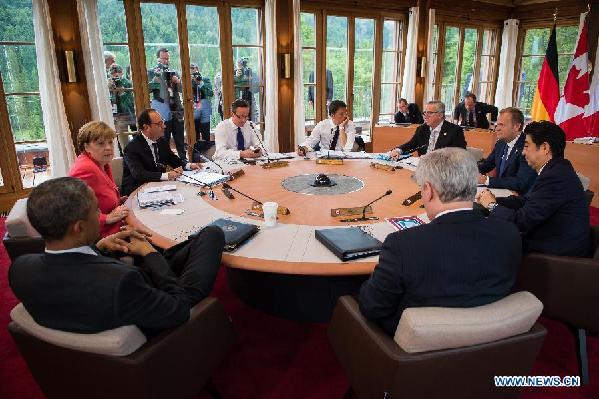Is Europe risking the most in the new Cold War?
- By Giovanni Vimercati
 0 Comment(s)
0 Comment(s) Print
Print E-mail China.org.cn, June 11, 2015
E-mail China.org.cn, June 11, 2015
|
|
|
Participants attend a meeting session during the G7 summit at the Elmau Castle near Garmisch-Partenkirchen, southern Germany, on June 8, 2015. Germany hosted a G7 summit here on June 7 and June 8. [Xinhua/Bundesregierung/Kugler] |
At the recent G7 summit in Germany, United States President Barack Obama once again pushed for more sanctions to be imposed on Russia if the armed conflict in Ukraine continues. That is likely to happen, since American military personnel are training Ukrainian troops, thus escalating the conflict rather than trying to defuse it. To comprehend the fundamental illegitimacy of this request, imagine if Russia asked the international community to impose sanctions on America because of the wars it has waged in Iraq and Afghanistan. The very prospect sounds ridiculous and highly implausible, yet the exact opposite is absolutely normal. This alone illustrates the imbalanced perception from which Western commentators suffer, a perception that is often an inherited reflex rather than a conscious political stance.
The U.S. administration knows that hardly any Western European government will ever oppose the "guidelines" coming out of Washington (though some countries seem to be more discerning than others in following the new cold warriors, France and Germany for instance, whose presidents flew to the latest Minsk talks in an attempt to avoid all-out war). Succumbing to U.S. pressure, Western Europe has effectively isolated the Russian Federation, thus pushing the latter to forge an even tighter strategic alliance with its powerful eastern neighbor, China. A new energy deal was in fact recently signed between Russia and China. The so-called Western Route will see the Altai pipeline transport 30 cubic gigameters of gas from the Jamal peninsula and western Siberia to China over the next 30 years. Gas supplies will be paid for in either yuan or roubles, not in U.S. dollars.
Such a move could very well result in an increase in the price of gas coming from Russia and destined for Western Europe. Since the start of the Ukrainian conflict, in fact, the South Stream project has been called off (three European companies were to take part in this venture: Enel, Edf and Wintershall), and a new Turkish (and Greek) Stream has been announced. Once again, Western Europe is likely to pay the price of this geopolitical and economic diversion. Squeezed between American interests and Russian strategic reassessment, Europe is risking paying the higher price in this first stage of the new Cold War.






